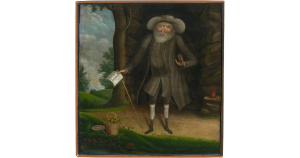The Story Of Benjamin Lay (1682 – February 8, 1759)
... only four foot seven in height; his head was large in proportion to his body, the features of his face were remarkable
... He was hunch-backed, with a projecting chest, below which his body become much contracted. His legs were so slender, as to appear almost unequal to the purpose of supporting him.

Benjamin Lay
The Lesson In This Saga
- Walk The Walk
If you have deep convincing convictions that people should raise the bar. Start within, before going after those outside of yourself. Quite often many a Preacher will make claims or push agenda's while not living their Truth. Benjamin Lay Walked The Walk in his Truth.
Physician Heal Thyself - Luke 4:23 - Seed Planting Is Not Linear
If you feel that you should stand and speak. Do so without the expectation of seeing immediate results. Embrace the idea that you are planting a very long term seed. If your cause shows immediate fruit. That is awesome, most ideas take several years before you see any fruits of the labor. It is not in vein, it is a beginning. - Being Radical May Not Be Conducive To Harmony
If you decide to take radical steps to overcoming what is happening in your life. Don't be surprised by the push back by those that are comfortable in their own path. Often people are reluctant to accept change. - Work Within The System For New Direction
Benjamin Lay was a smart, radical & devout individual. However it appears John Woolman was a little more strategic in his approach. John operated within the accepted norms for his era, provoking change with subtle direction which lasted long term within the Quaker Movement. - Just Because It Is In The Bible, Does Not Make It Right
Slave owners often justified slavery using the Bible. One popular pro-slavery verse was "Servants, be obedient to them that are your masters according to the flesh, with fear and trembling, in singleness of your heart, as unto Christ." Ephesians 6:5
Slave owners published heavily edited versions of the Bible; in the standard protestant Bible there are 1,189 chapters, but the Slave Bible has only 232 chapters. References to freedom and escape from slavery were removed and at the same time the passages which promoted obedience and submission were emphasized.
There comes a time when new doctrines of fairness and love in God must come to pass. Religion that does not grow dies. This happened with the abolition of slavery; there was widespread pain from the destructive forces of the Civil War, but when President Lincoln issued the Emancipation Proclamation freeing the slaves, he captured the hearts of millions of Americans and transformed the mood of the war.
"This is a world of compensations; and he who would be no slave, must consent to have no slave. Those who deny freedom to others, deserve it not for themselves; and, under a just God, can not long retain it." President Lincoln in a letter to Henry L. Pierce April 6, 1859
Man was able to rise above the archaic Biblical Doctrines of the past and look to the future with love and hope in their hearts.
Benjamin Lay is an important historical figure. He was three hundred years ahead of his time in so many ways. An amazing human, and quite a dynamic charismatic character. He definitely upset the normal comfort zone of the Quaker Church. Many generations of Quakers would have a picture of Benjamin Lay on the walls of their homes. An unstoppable force. I encourage you to learn more about one of the most important people in history, who is not well known... The Quaker Comet, Mr. Benjamin Lay.
Further Reading:
The following links in this section were used in research of this document.
- Wikipedia
- Quakers And Slavery
- Quakers In The World
- Smithsonian Magazine
- The Beacon Press
- Stuff You Missed In History
- Nine Radical Facts about Abolitionist Quaker Dwarf Benjamin Lay
- Lincoln On Slavery
- Slave Bible From The 1800s Omitted Key Passages That Could Incite Rebellion
This document's original draft was written by AJ White-Wolf. A wonderful Ghost Writer who wishes to remain anonymous: helped to expound and make the document more coherent. The Ghost Writer has been a very big blessing in the process. - AJ White-Wolf